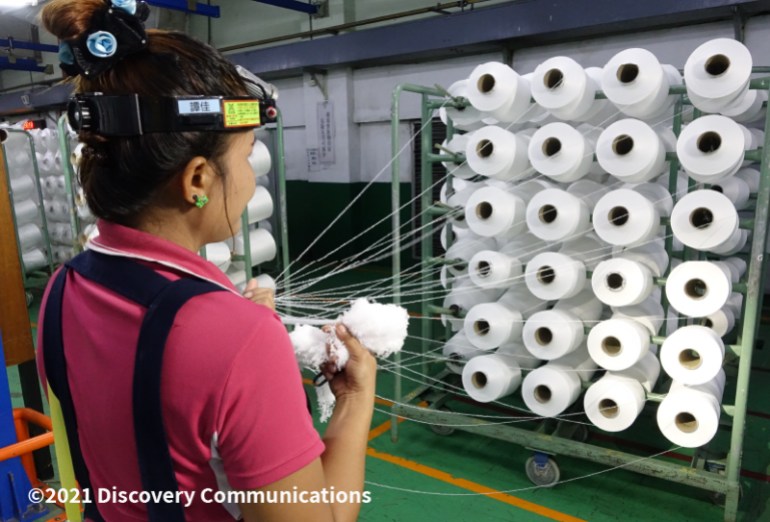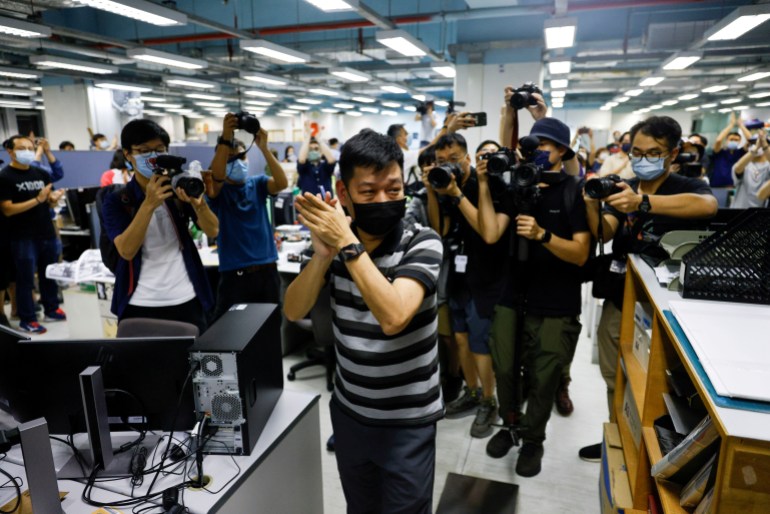TaiwanPlus tries to change the narrative on self-ruled island
New media outlet launched as the democratic island, which is claimed by Beijing, faces an increasingly hostile China.

Taipei, Taiwan – Creating a brand new media outlet from scratch is an enormous challenge for any team, but in Taipei the staff at TaiwanPlus is trying something even more difficult.
From two-minute video clips to 45-minute films on topics like culture, health, tech and politics and a half-hour daily news programme, they want to stake a greater presence for diplomatically isolated Taiwan in the international media space, and change the way democracy is talked about overseas.
Keep reading
list of 4 itemsXi vows Taiwan ‘reunification’, but holds off threat of force
Taiwan president says island does not seek military confrontation
US secretly training Taiwan forces since last year: Reports
“For us, our main goal is to tell stories about Taiwan that are not being told in the international media, and to tell a fair story about Taiwan for good or for bad,” said Andrew Ryan, deputy director of news at TaiwanPlus.
Foreign media coverage of Taiwan has long been framed in terms of its relationship with Beijing, which claims the island as its own, and due to its disputed political status is never referred to as a “country” in media except at home.
Since the election of President Tsai Ing-wen in 2016, however, foreign coverage has begun to change thanks in part to stories that have global resonance – from being the first in Asia to legalise same-sex marriage to Taipei’s successful COVID-19 response.
The political crackdowns in China and Hong Kong have also helped boost interest in Taiwan as a successful democracy where freedom of speech is prized. More recently it has become a refuge for some of the 20 foreign journalists expelled by Beijing since last year.
TaiwanPlus, the island’s first-ever English-language video news platform, launched officially on August 30.


The large cardboard backdrop with the company’s cross logo and the numbers “8/30” or August 30, still feature prominently in the office, which sits in part of central Taipei’s Central News Agency building, where Associated Press, Agence France Presse and Japan’s Kyodo News also have offices.
Starting out with a team of less than 20, TaiwanPlus now has more than 70 employees and appears to be growing, spilling out into other free space.
Next year, the operation will move to new offices that are expected to have more of a “start-up” feel rather than the current decor – institutional grey carpet, ceiling tiles and fluorescent lighting.
Staff include journalists from Taiwan and abroad who have experience in major foreign media outlets like the Associated Press, BBC, Bloomberg, and The Washington Post. TaiwanPlus News Center Director Divya Gopalan previously worked for Al Jazeera.
Soft power projection
While it is still too early to measure the impact of TaiwanPlus, Chiaoning Su, an assistant professor in the Department of Communication, Journalism and Public Relations at Oakland University in the US, says the outlet has a lot of potential to expand Taiwan’s soft power reach.
“I think that for every country, they need to work on self-promotion and nation branding, they need to work on projecting themselves to an international audience, and through that as a way to ask for international support,” Su said. “I think this is especially important for a country like Taiwan, that’s so small and (whose) international status is actually ambiguous.”
TaiwanPlus is currently operated as a project of the Central News Agency, Taiwan’s state-owned wire service, and reports to the Ministry of Culture, which will, in turn, distribute approximately $200m in funds over the next four years.
TaiwanPlus has been promoted as an “independent” news outlet but its relationship with the government has raised some questions in Taiwan about whether that will be possible.
In East Asia, this question is particularly prescient as media in Hong Kong, a territory once seen as the regional centre for press freedom, are under heavy government scrutiny for their coverage of the city’s 2019 protests and working under new China-imposed national security legislation.
Pro-democracy tabloid Apple Daily has been forced to close, while at RTHK, Hong Kong’s public broadcaster, the appointment earlier this year of a new director, a career civil servant with no media experience, has led to a wave of resignations, firings and programme cancellations.

A more patriotic tone has also crept into the editorial pages of the South China Morning Post, Hong Kong’s best-known English-language newspaper overseas.
“Tsai’s refusal to acknowledge that there is only one China is the cause of cross-strait tensions,” the paper wrote in an editorial on Tuesday. “Until she scraps her independence-minded rhetoric and policies, there is no chance of certainty and greater prosperity for Taiwanese.”
Cedric Alvani, director of Reporters Without Borders Asia-Pacific East Asia office, says a good test of TaiwanPlus will be whether it produces segments that are critical of the government and the ruling Democratic Progressive Party.
Others, like Jaw-Nian Huang, an assistant professor at National Chengchi University who has written about press freedom in Taiwan, say after the outlet’s current arrangement with CNA expires, it should be spun off into an autonomous outlet.
“Taiwan Plus’s current organisational and financial structures can’t ensure its independence because its funder, owner, and the executor are official,” Huang said. “However, it doesn’t mean that there isn’t any autonomy. If the authorities are willing to let TaiwanPlus develop without interference, it will be more autonomous, and vice versa.”
For now, though, Ryan says TaiwanPlus intends to operate as an independent outlet with separate staff, budget and editorial decisions from CNA, although they do receive administrative support from their parent organisation as they are not yet considered a “legal entity.”
The platform currently has an independent board of commissioners to oversee its work, but Huang says TaiwanPlus should eventually be housed under an organisation like the Taiwan Public Television Service Foundation, whose funding is less tied to government oversight.
“It needs more reforms to ensure its independence, making TaiwanPlus represent the nation, not the government or party,” Huang said.
Countering the Beijing story
The launch comes with Taiwan’s domestic media facing its own struggles.
The island ranks 43rd on the RSF’s annual press freedom survey, one spot ahead of the United States but also one spot behind South Korea.
While government interference is rare these days, media experts say widespread sensationalism and misinformation campaigns linked to Beijing have eroded the quality of Taiwanese journalism. News outlets are also considered highly partisan and skew in opposite directions towards Taiwan’s two major political parties.

Both trends have been apparent since the outbreak of COVID-19 as Chinese-language media plays a major role in spreading vaccine scepticism and conspiracy theories about Taiwan’s vaccine shortages that seek to pin the blame on the government and skirt global production problems.
“This is an island with only 23 million people where you have seven to eight 24/7 news channels competing against each other, so there is fierce competition,” said Chiaoning Su.
TaiwanPlus, however, will be competing in the world of government-affiliated outlets like Voice of America, France 24, China’s CGTN and Iran’s Press TV – which all look abroad to find their audience with English-language content.
Due to TaiwanPlus’s limited budget, however, its operations are smaller in scale than its counterparts and 24-hour news coverage does not appear to be in the works anytime soon.
Publicly available traffic data compiled by the US marketing company SEMRush showed 324,400 site visits in September and 75,600 unique visitors with an average visit time of around 13 minutes. Its two YouTube channels, which contain much of the same content, have accumulated about 7,000 subscribers and 123,000 views.
Even with its more modest ambitions, however, experts like Huang say TaiwanPlus may still be able to make an impact as it matures into an established media outlet, especially by offering a counter-narrative overseas to Beijing-backed media.
It may also prove also popular with the Taiwanese and ethnic Chinese diaspora, as many live in English-speaking countries such as the US, Canada, and Australia.
“There (is a limited) English audience in Taiwan, so it won’t influence the domestic media a lot. Taiwan Plus is the English media that targets the international audience, which includes the English-speaking foreigners and the overseas Taiwanese and Chinese,” he said, so they are hoping to provide “alternative information resources and Taiwan perspectives to China’s overseas propaganda, such as CGTN.”